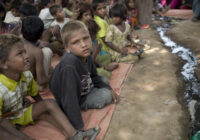In the Middle East and North Africa, rates of unemployed young women are eight times that of men. This is the last of a two part series. Read part one here.
As Jamie McAuliffe, president and CEO of Education for Employment (EfE), remarked at the WEF conference in Jordan: “We are trying to get governments and businesses to identify job-creating sectors and encourage investors to engage in them.” He also spoke of the need to encourage entrepreneurship and facilitate ways for young people to start small businesses through micro-financing programs. He went on to emphasize with regards to women that: “The rates of unemployment are as high as eight times that among young men,” and that “getting young women into the work force and supporting opportunities for them to become entrepreneurs is one of the critical challenges and opportunities.”
Entrepreneurship, however, due to the hesitation of financial institutions and inadequate legal structures, is more attractive than attainable at this time in the Middle East and North Africa (MENA). Even in the Gulf Cooperation Council (GCC) countries, enabling business start-ups largely remains tied to one’s status and social connections rather than the business prospects of the product or service.
So in addition to the four factors listed above, one could add a fifth: the role of the informal economy, which for many is the only accessible outlet for entrepreneurship since official channels are full of obstacles for those with little experience or education to manage the multiple steps for launching a business.
Another concern expressed in The WEF program was engaging youth to perceive employment as more than work and more as a career, that is, acquiring skills that over time enable one to reach higher levels of achievement and compensation – critical in societies that place such a high premium on marrying well and being able to provide for a family. With the concern that public payrolls can no longer support inefficient labor practices, and the lack of diversity in most MENA economies, the IMF has issued a report on the need for greater private sector absorption of new job entrants. This will require a long-term, multifaceted program working with governments in hands-on technical and vocational training projects, as well as higher quality and better targeted secondary and tertiary education.
A sotto voce topic that relates to youth attitudes towards work is their perspectives on the kind of work and on-the-job behaviors that they value. Dealing with the expectations of job applicants is a nagging complaint across the MENA, especially about those with university educations and few practical skills. With few role models to emulate that are not tied to “the old ways,” young people range from those who are poorly or partly educated and unskilled and semi-skilled through experience, to those who are educated and unskilled with expectations that are not aligned with prospects in their economy.
It is no wonder that when youth across the region are polled about their job choices, more than 30 percent believe emigration is their best alternative. Joe Saadi, chairman of Booz and Company and managing director of its Middle East practice, painted the stark consequences of lagging youth recruitment: “Every year you don’t have the capacity to absorb newcomers into the labour force, you’re compounding the unemployment issue and, given the social and economic pressure in the region, there is this sense of urgency setting in.”
An interesting and in some ways compelling recommendation from someone whose company recruits young people, is to institute a form of compulsory service for six months in order to change the mindset of young people unwilling to consider certain jobs. This would instill values consistent with the workplace, according to Mohammed Al Mady, CEO of Saudi Basic Industries Corporation (SABIC), which has more than 20,000 employees. He believes that this approach will: “Teach them resilience, teach them modesty, teach them how to work and take the ladder step by step until they reach what they want.” Al Mady pointed out that even the recent Saudi labor policy to force the private sector to employ more nationals – nitaqat – did not necessarily address the problem of improving the quality of youth for employment purposes.
Case: Youth Employment Challenges in Morocco
Morocco has yet to experience significant economic dislocations as a result of the Arab Uprisings, and its subsequent actions may serve as a potential case study of a North African country that has undergone the least amount of turmoil while advancing economic reforms that in no small part are focused on the labor force.
The Arab World Competitiveness Report 2013 identifies education and the inefficiency of the labor market as the most obvious drags on the kingdom’s competitiveness and social cohesion. Not only is the public education system not aligned sufficiently with the needs of business, “the labour market structure needs to allow for an efficient use of talent and sufficient flexibility.”
As in other Arab countries, youth between the ages of 15 and 29 account for about 30 percent of the population and 44 percent of those of working age. “Official statistics indicate that about 90 percent of young women and about 40 percent of young men, who were not studying in the past couple of years, are either unemployed or part of the economically inactive groups.”
In a thoughtful analysis, Lahcen Achy, an economist specializing in the MENA, adds a less visible, yet critical piece of analysis: “Young people spend on average 80 percent of their time hanging out or doing personal and recreational activities that are highly unproductive.”
He challenges the stereotype that the situation is most critical for unemployed university graduates. “Most of the unemployed youth in Morocco have either low education levels or haven’t studied at all… those who are least educated are left without any help… and only 8 percent of unemployed youth have benefited from [the National Agency for the Promotion of Employment and Skills] services.”
His argument is that the marginalized youth, whose numbers far exceed university graduates, must be targeted for both employment and social integration. Involving the private sector has had some success, but the pace of generating jobs with wages that meet living needs (including prospects for marriage and family) is woefully short. Morocco is aiming at a more systematic and integrated employment strategy in partnership with a number of international agencies. For example, the European Training Foundation (ETF) has brought together business and civil society groups to exchange views on options “to improve human capital in the country’s small business sector.”
Across the board, recommendations include a more integrated framework for promoting entrepreneurship from primary through university education; women’s entrepreneurship as a national priority; and better access to finance, training, and coaching services as well as data collection on the impact of these programs that would allow for policy formulation – a necessary component if the informal sector is to evolve into a dynamic part of the nation’s economy.
Recent programs in the US and a joint certification program developed with French technical assistance provide opportunities for workers who have gained skills outside the formal system to receive certification of their accomplishments, which will enable them to move up the value chain, perhaps even become an entrepreneurial offshoot from existing industries.
It is in this environment of accelerating demands for youth employment and bringing greater efficiencies to workforce development that underlines the importance of coming to grips with the challenges before they become widespread regime liabilities. The government’s inability to date to move its agenda of economic reforms through parliament has resulted in a stalemate that threatens progress in facilitating economic growth.
King Mohammed VI’s insistence that the educational sector be insulated from political volleyball may help renew a national debate and progress on strategies to move forward more aggressively on measures to improve Morocco’s competitiveness — a key factor in attracting the domestic and foreign investment critical to generating the jobs so badly needed in the country.
The views expressed in this article are the author’s own and do not necessarily reflect Fair Observer’s editorial policy.
Image: Copyright © Shutterstock. All Rights Reserved
Support Fair Observer
We rely on your support for our independence, diversity and quality.
For more than 10 years, Fair Observer has been free, fair and independent. No billionaire owns us, no advertisers control us. We are a reader-supported nonprofit. Unlike many other publications, we keep our content free for readers regardless of where they live or whether they can afford to pay. We have no paywalls and no ads.
In the post-truth era of fake news, echo chambers and filter bubbles, we publish a plurality of perspectives from around the world. Anyone can publish with us, but everyone goes through a rigorous editorial process. So, you get fact-checked, well-reasoned content instead of noise.
We publish 3,000+ voices from 90+ countries. We also conduct education and training programs
on subjects ranging from digital media and journalism to writing and critical thinking. This
doesn’t come cheap. Servers, editors, trainers and web developers cost
money.
Please consider supporting us on a regular basis as a recurring donor or a
sustaining member.
Will you support FO’s journalism?
We rely on your support for our independence, diversity and quality.









Comment